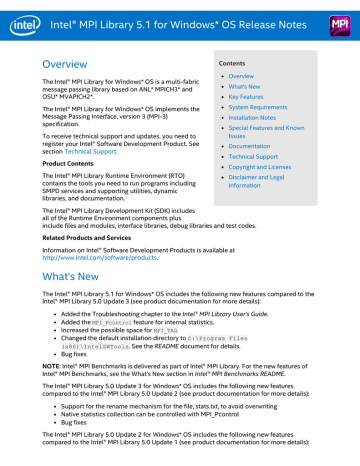
#Intel visual fortran 15 release notes full#
The Intel Fortran Compiler (Beta) supports full Fortran 77/90/95 and has partial support of the Fortran 2003 standard. The Intel Fortran Compiler Classic fully supports Fortran through the 2018 standard. This includes loop interchange, loop fusion, loop unrolling, loop distribution, data prefetch, and more. High-level optimizations are optimizations performed on a version of the program that more closely represents the source code. Thus, all optimizations can benefit from profile-guided feedback because they are less reliant on heuristics when making compilation decisions. The two can be combined to provide workload-based optimizations within which the logical-flow is optimized. This is in contrast to IPO which optimizes applications according to the logical flow of the application independent of workloads. The compiler uses these data to organize application execution to optimize performance based on how the application is actually used. Regarding profile-guided optimization, the compiler generates a dataset of performance-related information from using the application with representative workloads, which it then analyzes to find which parts of the application are executed more and less frequently. Interprocedural optimization applies typical compiler optimizations (such as constant propagation) but uses a broader scope that may include multiple procedures, multiple files, or the entire program.

Intel Fortran Compilers support three separate high-level techniques for optimizing the compiled program: interprocedural optimization (IPO), profile-guided optimization (PGO), and other high-level optimizations (HLO).
#Intel visual fortran 15 release notes code#
They are designed to minimize stalls and to produce code that executes in the fewest possible number of cycles. Intel compilers are optimized for computer systems using processors that support Intel architectures. When used with Intel cluster tools (see the "Description of Packaging" below) the compiler can also automatically generate Message Passing Interface calls for distributed memory multiprocessing from OpenMP directives. When used with the Intel HPC toolkit (see the "Description of Packaging" below) the compiler can also automatically generate Message Passing Interface calls for distributed memory multiprocessing from OpenMP directives.įor more information on Fortran standards, a number or resources are available, such as the Wikipedia Fortran entry or the Fortran wiki page.

The 2021 beta compiler focuses on OpenMP for GPU Offload.

The 2021 release of the Classic compiler adds full Fortran support through the 2018 standard, full OpenMP* 4.5, and Initial Open MP 5.1 for CPU only. In 2020 the existing compiler was renamed “Intel Fortran Classic” (ifort) and a new Intel Fortran Compiler (beta) (ifx) supporting GPU offload was introduced. On macOS and Linux, it is known as Intel Fortran. On Windows, it is known as Intel Visual Fortran. A specific release of the compiler (11.1) remains available for development of Linux-based applications for IA-64 ( Itanium 2) processors. The compilers generate code for IA-32 and Intel 64 processors and certain non-Intel but compatible processors, such as certain AMD processors.


 0 kommentar(er)
0 kommentar(er)
